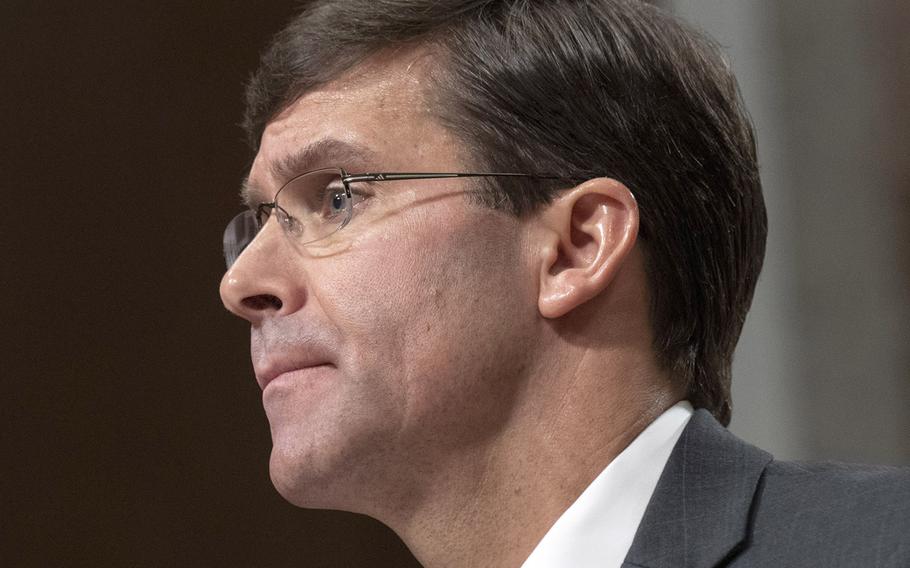
Army Secretary Mark Esper, at a July 16, 2019 Senate hearing on his nomination to serve as the next secretary of defense. (Joe Gromelski/Stars and Stripes)
WASHINGTON — The Senate on Tuesday confirmed Mark Esper as defense secretary, ending seven months of turmoil about who would secure the top job at the Pentagon and lead the U.S. military.
Esper was confirmed in a 90-8 vote by the Senate. Sens. Amy Klobuchar, D-Minn., Elizabeth Warren, D-Mass., Kamala Harris, D-Calif., Kirsten Gillibrand, D-N.Y., and Cory Booker, D-N.J., who are all Democratic presidential candidates, were among the lawmakers who voted against Esper.
Since former Defense Secretary Jim Mattis resigned Dec. 31, there have been three acting defense secretaries leading the Pentagon. Former acting Defense Secretary Patrick Shanahan was announced by the White House in May as President Donald Trump’s intended nominee for the position, though it never happened. Shanahan resigned in June after several news outlets reported incidents of domestic violence within his family. Trump then selected Esper to be acting defense secretary. By July 15, his nomination to the position was submitted to Congress. Navy Secretary Richard Spencer then stepped in as acting defense secretary while Esper went through the Senate confirmation process. Spencer will leave the post Tuesday after Esper is appointed to the job.
“We’re in a very great position we're not very often in that we have someone that is enthusiastically supported by Republicans, by Democrats, and he is obviously the right person who has the trust of our president, he has the trust of our military, the trust of Congress and the country to keep our nation safe,” Sen. Jim Inhofe, R-Okla., chairman of the Senate Armed Services Committee, said before the Senate voted to confirm Esper.
Esper is the first defense secretary to have graduated from a service academy, the U.S. Military Academy at West Point in 1986. He received a commission as an infantry officer and later worked on Capitol Hill as a staffer and then as the vice president for government relations at Raytheon, the top lobbyist for the country’s third largest defense contractor.
Esper’s confirmation to defense secretary was quick, lasting seven business days from his nomination to the vote approving his appointment to the job. But he faced a confrontation during his confirmation hearing July 16 with Warren, who raised concerns about potential conflicts of interests with his former employer Raytheon. Despite Warren’s objections, Esper was approved Thursday for the job by the Senate Armed Services Committee in voice vote.
Some members of the Senate Armed Services Committee voiced their approval of Esper as defense secretary, while others said they are dissatisfied following the confirmation vote.
Sen. Roger Wicker, R-Miss., said Tuesday in a statement that Esper’s experience as a West Point graduate, a combat veteran, a defense industry professional, and as the Army secretary “have prepared him well to serve as our next secretary of defense. Secretary Esper will be an outstanding leader for the Pentagon at a time when our national security faces many challenges and growing threats.”
Sen. Joni Ernst, R-Iowa, also highlighted Esper’s experience in the military and as Army secretary as qualifications to be defense secretary.
“I’ve enjoyed working closely with…Esper in his role as secretary of the Army, and will continue to work with him on a number of my priorities, including addressing sexual assault in the military, supporting our military families, improving readiness, and modernizing our forces,” she said in a statement.
But in a tweet Tuesday after the Senate vote, Gillibrand said she voted against Esper because “he fundamentally misunderstands the discriminatory effect of the military transgender ban. He's not prepared to truly address military sexual assault. Moreover, I oppose his views on the use of [the] old [Authorization for Use of Military Force] to continue hostilities."
After the Senate paperwork from the confirmation vote is sent to the White House, Trump is expected to sign the appointment letter for Esper as defense secretary Tuesday evening, at which point Esper will have the job officially, Jonathan Hoffman, chief Pentagon spokesman, said Tuesday. His official swearing in also is scheduled to take place Tuesday evening and his first day as defense secretary is expected to be Wednesday.
David Norquist was nominated Tuesday by Trump to be the next deputy defense secretary, a role that he has been serving in since January. His confirmation is schedule for Wednesday before the Senate Armed Services Committee.
With Esper’s move to defense secretary, Ryan McCarthy, the undersecretary of the Army, is expected to be nominated as Army secretary. Trump announced in June that McCarthy was his choice. When Esper was the acting defense secretary, McCarthy had stepped up to become the acting Army secretary and will return to that role now that Esper is defense secretary. If nominated for Army secretary, McCarthy would not have to step down as acting secretary because as the first principal deputy to the secretary, he is responsible for filling the role if it is vacant.
Kenney.Caitlin@stripes.com Twitter: @caitlinmkenney